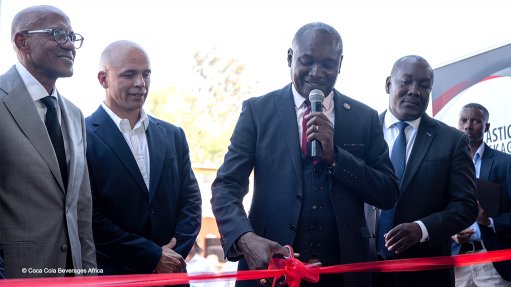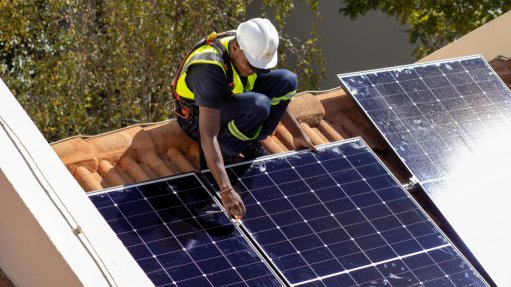Only urgent, proactive action will avert a water crisis in SA, says SEW-Eurodrive MD
South Africa needs to urgently and proactively address its looming water crisis, and while some movement in infrastructure projects is noticeable, SEW-Eurodrive MD Raymond Obermeyer avers it will take some time to gain traction.
He says that the deteriorating state of South Africa’s water infrastructure assets has been well documented and the Department of Water and Sanitation (DWS) is well aware of the extent of the crisis.
“South Africa’s water infrastructure is in a woeful state after decades of mismanagement and inadequate maintenance,” he highlights.
Over 50% of South Africa’s 1 150 treatment plants are in a poor and critical condition, with 265 in a state of decay while the Iris dashboard data reveals that 75% of wastewater treatment plants run by municipalities achieved less than 50% compliance to minimum effluent standards in 2020.
“In addition to poorly managed water infrastructure, the country has also allowed many of its rivers and dams, including the Vaal river and the Vaal and Hartbeespoort dams, to become polluted in recent years,” he adds.
The most recent South African Institute of Civil Engineering Infrastructure Report Card classified the country’s bulk water resources infrastructure and water supply for nonurban areas as being at risk of failure and blamed the deterioration on insufficient maintenance and neglect, funding shortfalls and a depletion of skills at senior levels.
“The reality is that South Africa’s water challenges are not going to be solved overnight. It takes many years to build water infrastructure [which] is expensive to fund. Given the constrained state of government’s finances, there is the genuine risk that funding challenges will delay these projects. As a result, it may well be public–private partnerships that will fund, implement and manage these water projects.
“We need measurable action when it comes to managing water. A key element is to better manage our scarce water resources sustainably with infrastructure that is fit-for-purpose. Should we fail, the Eastern Cape will not be the only province contemplating a day in the not-too-distant future when the taps run dry,” he warns, referring to the perilously low water levels of the Eastern Cape’s dams after a multiyear drought.
Some dams servicing Nelson Mandela Bay are at record lows and the province’s main water supplier, Kouga dam, is currently at less than 4% capacity, of which only 1.5% is usable water.
The Impofu dam, the second largest in the province, is at 16.64% capacity.
Severe water restrictions have been imposed in the province to delay the potential occurence of Day Zero.
While the Eastern Cape’s water shortages are primarily the result of a six-year-long drought, he says the situation has been exacerbated by the poor management of water infrastructure.
“A well-maintained and sustainable water and sanitation system is essential for any functioning economy. Water scarcity has a profoundly negative influence, impacting economic productivity, livelihoods, safety and security,” says Obermeyer.
Managing South Africa’s water resources sustainably and responsibly is critical.
Looming Crisis“However, it finally appears that government has started to acknowledge the scale of the looming water crisis with the accelerated establishment of a National Water Resources Infrastructure Agency and the prioritisation of 11 water and sanitation-related infrastructure projects valued at R106-billion,” he comments.
Four of these projects, valued at about R68-billion, are ready for investment. with construction expected to start in the next two years.
“For several years, there have been calls for the establishment of a National Water Regulator, based on the theory that the DWS cannot be both a player and a referee in this space.”
Comments
Press Office
Announcements
What's On
Subscribe to improve your user experience...
Option 1 (equivalent of R125 a month):
Receive a weekly copy of Creamer Media's Engineering News & Mining Weekly magazine
(print copy for those in South Africa and e-magazine for those outside of South Africa)
Receive daily email newsletters
Access to full search results
Access archive of magazine back copies
Access to Projects in Progress
Access to ONE Research Report of your choice in PDF format
Option 2 (equivalent of R375 a month):
All benefits from Option 1
PLUS
Access to Creamer Media's Research Channel Africa for ALL Research Reports, in PDF format, on various industrial and mining sectors
including Electricity; Water; Energy Transition; Hydrogen; Roads, Rail and Ports; Coal; Gold; Platinum; Battery Metals; etc.
Already a subscriber?
Forgotten your password?
Receive weekly copy of Creamer Media's Engineering News & Mining Weekly magazine (print copy for those in South Africa and e-magazine for those outside of South Africa)
➕
Recieve daily email newsletters
➕
Access to full search results
➕
Access archive of magazine back copies
➕
Access to Projects in Progress
➕
Access to ONE Research Report of your choice in PDF format
RESEARCH CHANNEL AFRICA
R4500 (equivalent of R375 a month)
SUBSCRIBEAll benefits from Option 1
➕
Access to Creamer Media's Research Channel Africa for ALL Research Reports on various industrial and mining sectors, in PDF format, including on:
Electricity
➕
Water
➕
Energy Transition
➕
Hydrogen
➕
Roads, Rail and Ports
➕
Coal
➕
Gold
➕
Platinum
➕
Battery Metals
➕
etc.
Receive all benefits from Option 1 or Option 2 delivered to numerous people at your company
➕
Multiple User names and Passwords for simultaneous log-ins
➕
Intranet integration access to all in your organisation


















